Cologne years
| | This section is empty. You can help by adding to it. (January 2011) |
The British Summary Court was a court created by the Treaty of Versailles that sat as part of the Inter-Allied Rhineland High Commission to oversee the occupation of the Rhineland. It lasted ten years, from 1919 to 1929.
The court was created by the Treaty of Versailles on 28 June 1919, which created the Inter-Allied Rhineland High Commission to supervise occupied territories and "ensure, by any means, the security and satisfaction of all the needs of the Armies of Occupation". This included the ability to create limited laws and ordinances, and a court was needed to enforce them. From 1919 to 1925 the court sat in Cologne, sitting in Wiesbaden from 1926 until the withdrawal of British forces in 1929. [1]
The court was set up like a magistrate's court, with a barrister presiding as a judge and another barrister acting as a permanent prosecutor. The judge would hold temporary military rank, and would normally act as the sole decider of both fact and sentence; if the potential sentence was more than two years, up to five other officers would also sit as judges. The defendant could be represented by any legal counsel, British or German, and the court could work in both the English and German languages. [2] The court heard 4,295 cases between 1919 and 1925, with possible sentences for minor offences including fines and prison sentences of between seven and fourteen days, normally served in a standard German prison. [3] Most cases were about possessing weapons illegally, straying onto British property, occupying carriages in trains reserved for British officers, reckless driving and possessing British Government property. The courts were well attended by German civilians, and German lawyers also attended to make a study of British legal procedure. [4]
| | This section is empty. You can help by adding to it. (January 2011) |
Major H. Gatehouse was the presiding barrister during the period 1926–1929. The court dealt with 595 cases. Of these 54 resulted in acquittal. The bulk of the cases were charges against women in respect of violation of deportation orders made by the High Commission. The sentences did not exceed 9 months imprisonment, a sentence which was served in a German prison. [5]

The Treaty of Versailles was a peace treaty signed on 28 June 1919. As the most important treaty of World War I, it ended the state of war between Germany and most of the Allied Powers. It was signed in the Palace of Versailles, exactly five years after the assassination of Archduke Franz Ferdinand, which led to the war. The other Central Powers on the German side signed separate treaties. The United States never ratified the Versailles treaty and made a separate peace treaty with Germany. Although the armistice of 11 November 1918 ended the actual fighting, it took six months of Allied negotiations at the Paris Peace Conference to conclude the peace treaty. Germany was not allowed to participate in the negotiations; it was forced to sign the final treaty.
The judiciary of Germany is the system of courts that interprets and applies the law in Germany.

The Locarno Treaties were seven agreements negotiated in Locarno, Switzerland, during 5 to 16 October 1925 and formally signed in London on 1 December, in which the First World War Western European Allied powers and the new states of Central and Eastern Europe sought to secure the post-war territorial settlement, in return for normalising relations with the defeated German Reich. It also stated that Germany would never go to war with the other countries. Locarno divided borders in Europe into two categories: western, which were guaranteed by the Locarno Treaties, and eastern borders of Germany with Poland, which were open for revision.
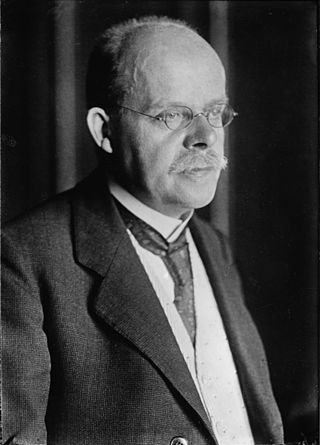
Wilhelm Marx was a German judge, politician and member of the Catholic Centre Party. During the Weimar Republic he was the chancellor of Germany twice, from 1923–1925 and 1926–1928, and served briefly as the minister president of Prussia in 1925. With a total of 3 years and 73 days, he was the longest-serving chancellor during the Weimar Republic.

The People's Court was a Sondergericht of Nazi Germany, set up outside the operations of the constitutional frame of law. Its headquarters were originally located in the former Prussian House of Lords in Berlin, later moved to the former Königliches Wilhelms-Gymnasium at Bellevuestrasse 15 in Potsdamer Platz.
The military alliance between the United Kingdom and Poland was formalised by the Anglo-Polish Agreement in 1939, with subsequent addenda of 1940 and 1944, for mutual assistance in case of a military invasion from Nazi Germany, as specified in a secret protocol.

Sir Hector Horace Hearne was an English barrister and judge.
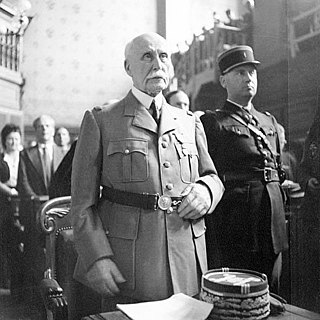
The épuration légale was the wave of official trials that followed the Liberation of France and the fall of the Vichy regime. The trials were largely conducted from 1944 to 1949, with subsequent legal action continuing for decades afterward.

The remilitarization of the Rhineland began on 7 March 1936, when German military forces entered the Rhineland, which directly contravened the Treaty of Versailles and the Locarno Treaties. Neither France nor Britain was prepared for a military response, so they did not act. After 1939 commentators often said that a strong military move in 1936 might have ruined Hitler's expansionist plans. However, recent historiography agrees that both public and elite opinion in Britain and France strongly opposed a military intervention, and neither had an army prepared to move in.

Petras Kubiliūnas was a Lithuanian lieutenant general and Chief of the Lithuanian General Staff in 1929–1934.
The Court of Civil Jurisdiction was a court established in the late 18th century, in the colony of New South Wales which subsequently became a state of Australia. The court had jurisdiction to deal with all civil disputes in the then fledgling colony. It was in operation between 1788, the date of establishment of the new colony, and 1814.

Marie Louis Adolphe Guillaumat was a French Army general during World War I.

The Occupation of the Rhineland from 1 December 1918 until 30 June 1930 was a consequence of the collapse of the Imperial German Army in 1918, after which Germany's provisional government was obliged to agree to the terms of the 1918 armistice. This included accepting that the troops of the victorious powers occupied the left bank of the Rhine and four right bank "bridgeheads" with a 30-kilometre (19 mi) radius around Cologne, Koblenz, Mainz and a 10-kilometre (6 mi) radius around Kehl. Furthermore, the left bank of the Rhine and a 50-kilometre-wide (31 mi) strip east of the Rhine was declared a demilitarized zone. The Treaty of Versailles repeated these provisions, but limited the presence of the foreign troops to fifteen years after the signing of the treaty.

The Leipzig war crimes trials were held in 1921 to try alleged German war criminals of the First World War before the German Reichsgericht in Leipzig, as part of the penalties imposed on the German government under the Treaty of Versailles. Twelve people were tried, and the proceedings were widely regarded at the time as a failure. In the longer term, they were seen by some as a significant step toward the introduction of a comprehensive system for the prosecution of international law violations.
The Inter-Allied Rhineland High Commission was created by the Treaty of Versailles on 28 June 1919, to supervise the occupation of the Rhineland and "ensure, by any means, the security and satisfaction of all the needs of the Armies of Occupation". It came into being on 10 January 1920, when the treaty came into force. It was based in Coblenz.
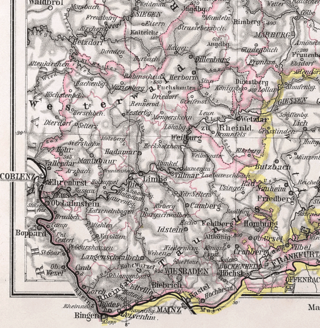
The Wiesbaden Region was one of three administrative regions from which the state of Hesse was formed in 1945.
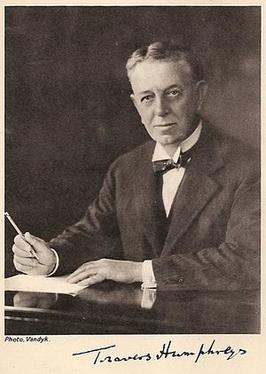
Sir Richard Somers Travers Christmas Humphreys was a noted British barrister and judge who, during a sixty-year legal career, was involved in the cases of Oscar Wilde and the murderers Hawley Harvey Crippen, George Joseph Smith and John George Haigh, the 'Acid Bath Murderer', among many others.
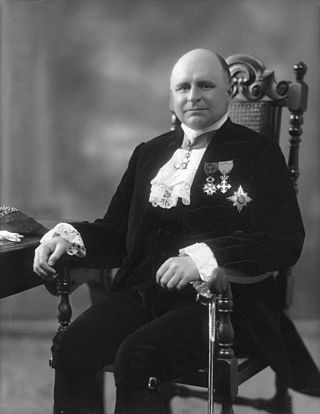
William Finlay, 2nd Viscount Finlay, was a British judge and peer who served as a Lord Justice of Appeal from 1938 to 1945.
Sir Hamilton John Leonard was an English barrister and High Court judge. Described as "one of the great criminal specialists of his generation". He was involved in several prominent criminal cases, but is best known for his sentencing in the Ealing vicarage case, for which he was widely criticised for giving two rapists what were perceived as lenient sentences.

Silvestras Leonas (1894–1959) was a Lithuanian military officer. After serving in the Russian Imperial Army during World War I, Leonas joined the Lithuanian Army and fought in the Lithuanian Wars of Independence. He completed law studies at the University of Lithuania and worked as a judge. In 1934–1935, he presided over the Military Tribunal trial of Neumann–Sass that involved 122 defendants accused of anti-Lithuanian activities. From March 1938 to March 1939, he was Minister of Internal Affairs in the government of Prime Minister Vladas Mironas. In 1944, Leonas was arrested by the NKVD and imprisoned in a Gulag camp. He returned to Lithuania in 1956.